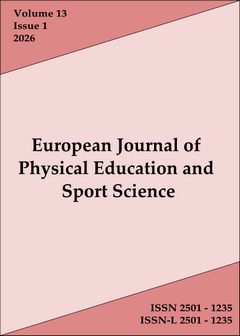European Journal of Physical Education and Sport Science is an international peer reviewed publication aimed to investigate the numerous educational aspects regarding physical activity and related area of research. Its main scope is to gather together scientists, scholars, and professionals from various research fields, including education, sport, physical activity, psychology, as well as physiotherapy, health and nutrition in order to deliver support and opportunity for multidisciplinary discussions and widespread comprehension of how physical activity interacts with human life. European Journal of Physical Education and Sport Science is published monthly on-line in English, Spanish, Portuguese and Italian. Research papers accepted: articles, communications, intervention studies, study cases, book reviews, commentaries, short reports, etc.Printed copies of the journal are available on request. The research papers can be submitted on line at education@oapub.org specifying the preferred journal.
Vol 13, No 1 (2026)

Table of Contents
Articles
|
Eva Leibinger, Rebekka Krogedal
|
|
|
Özge Sezik Tanyeri, Levent Tanyeri
|
|
|
Levent Tanyeri, Özge Sezik Tanyeri
|
|
|
Arman Sargsyan
|
|
|
Nguyen Thanh Liem, Dang Minh Thanh, Chau Hoang Cau, Tran Luong, Che Ngoc Han, Tran Phong Vinh
|
|
|
Danar Ariyanto, S. Siswantoyo, Trisnar Adi Prabowo
|
|
|
Nguyen Thanh Tra, Nguyen Pham Thanh An Thuy, Le Huynh Phuong, Le Minh Tuan, Tran Phong Vinh, Nguyen Quang Vinh
|
|
|
Nguyen Thanh Liem, Dang Minh Thanh, Ngo Khen, Nguyen Thi Tham, Nguyen Huu Tin
|
|







